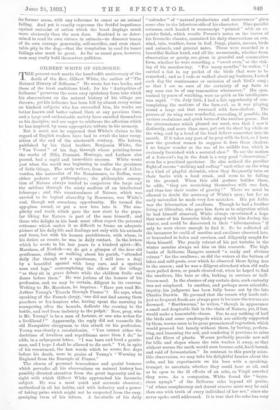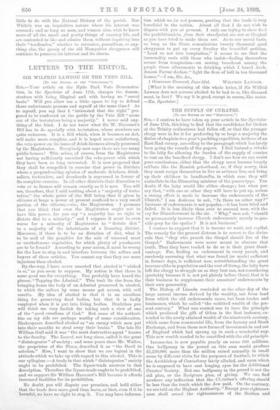GILBERT WHITE OF SELBORNE.
THE present week marks the hundredth anniversary of the death of the Rev. Gilbert White, the author of "The Natural History of Selborne." He wrote but two books, and those of the least ambitious kind ; for his "Antiquities of Selborne" preserves the same easy epistolary form into which iris observations on the natural history of his village are thrown; yet his influence has been felt by almost every writer on kindred subjects who has succeeded him, his works are better known and better valued than at any previous time, and a large and enthusiastic society have enrolled themselves as his disciples, and are eager to celebrate the affection which he has inspired, by some appropriate tribute to his memory.
But it must not be supposed that White's claims to the regard of English readers have had to await the later recog- nition of the end of the nineteenth century. His letters, published by his third brother, Benjamin White, the " Van Voorst " of his day, through whose printing-house the works of Ellis, Pennant, Montagu, and Latham also passed, had a rapid and immediate success. White wrote just when the world was beginning to realise the greatness of little things. The early writers, from the days of Aldro- vandus, the naturalist of the Renaissance, to Buffon, were ,either pedants or philosophers ; the philosophic concep- tion of Nature always tended to conjecture the large and -the sublime through the misty medium of an intellectual telescope ; and this unnaturalness of Nature, which was carried to its logical absurdity by Rousseau, was White's real, though not conscious, opportunity. He turned the spy-glass round, or put a new lens into it. The sim- plicity and truth which gave the new start to the popu- lar liking for Nature is part of the man himself; and those who delight in his book must often regret the personal reticence which makes it so difficult to frame an adequate picture of his daily life and dealings not only with his animals and trees, but with his human parishioners, with whom, in his duties as curate, he was in daily contact. In the letters which he wrote in his last years to a kindred spirit—Mr. Marsham, of Norfolk—we do get a glimpse of the dear old gentleman, riding or walking about his parish, "attended daily (for though not a sportsman, I still love a dog) by a beautiful spaniel with long ears, and a spotted nose and legs," contemplating the elders of the village " as they sit in grave debate while the children frolic and dance before them." He was jealous of the honour of his profession, and, we may be certain, diligent in its exercise. Writing to Mr. Marsham, he inquires "Have you read Mr. Arthur Young's Travels through France '? He says, when -speaking of the French clergy, 'one did not find among them poachers or fox-hunters who, having spent the morning in scampering after the hounds, dedicate the evening to the bottle, and reel from inebriety to the pulpit.' Now, pray, who is Mr. Young? is he a man of fortune, or one who writes for a livelihood P" Apparently, the reply did not reconcile the old Hampshire clergyman to this attack on his profession. Young was clearly a revolutionist. "You cannot abhor the -doctrines of levellers and republicans more than I do," he adds, in a subsequent letter. "I was born and bred a gentle- man, and I hope I shall be allowed to die such." Yet, in spite .of his resentment, the last words which he wrote, five days before his death, were in praise of Young's "Warning to England from the Example of France."
The charm of personal benevolence and quaint humour which pervades all his observations on natural history has possibly diverted attention from the great ingenuity and in- sight with which Gilbert White approached his favourite subject. He was a most quick and accurate observer ; methodical in all his habits, and with industry and a power of taking pains which might not be suspected from the easy, (gossiping form of his letters. A fac-simile of his daily " calendar " of "natural productions and occurrences" gives some clue to the laborious side of his character. Nine parallel columns, each headed in manuscript " printed " with an ex- quisite finish, which recalls Porson's notes on the leaves of his favourite classics, contained his daily observations on sun, wind, rain, weather, trees in leaf, fungi, plants, mosses, birds and animals, and general notes. These were recorded in a beautiful Italian hand, and all the memoranda, whether from observation or gossip, are given in graceful and consecutive form, whether he were recording a "sweet even," or the rick- ing of his meadow-hay. "For many months," be writes, "I carried a list in my pocket of the birds that were to be remarked ; and as I rode or walked about my business, I noted each day the continuance or omission of each bird's song ; so that I am as sure of the certainty of my facts as any man can be of any transaction whatsoever." His eyes, trained by years of watching, were as quick as his intelligence was rapid. "On July 12th, I had a fair opportunity of con- templating the motions of the fern-owl, as it was playing round a large oak that swarmed with fern-chafers. The powers of its wing were wonderful, exceeding, if possible, the various evolutions and quick turns of the swallow genus. But the circumstance which pleased me most, was that I saw it distinctly, and more than once, put out its short leg while on the wing, and by a bend of the head deliver somewhat into its mouth. If it takes any part of its prey with its foot, as I have now the greatest reason to suppose it, does these chafers, I no longer wonder at the use of its middle toe, which is curiously furnished with a serrated claw." To see the motion of a fern-owl's leg in the dusk is a very good "observation," even for a practised spectator. He also noticed the peculiar flight of ravens "striking and cuffing" each other on the wing in a kind of playful skirmish, when they frequently turn on their backs with a loud croak, and seem to be falling to the ground. When this odd gesture betides them, he adds, "they are scratching themselves with one foot, and thus lose their centre of gravity ! " There we must be allowed to doubt the accuracy of White's eyes ; but for an early naturalist he made very few mistakes. His pet foible was the hibernation of swallows. Though he had a brother living at Gibraltar, who gave him facts as to migration which he had himself observed, White always entertained a hope that some of his favourite birds stayed with him during the winter, and could be discovered in their " hibernaculum " if only he were clever enough to find it. So he collected all the instances he could of martins and swallows observed late, or benumbed in holes and crevices, and diligently sought for them himself. The yearly retreat of his pet tortoise in the winter months always set him on this research. The high banks of Selborne Hangers seemed "a ready and obvious retreat" for the swallows ; so did the waters at the bottom of lakes and mill-pools, over which he observed them flying late in the season; and he was a diligent attendant when old walls were pulled down, or ponds cleared out, when he hoped to find the swallows, like bats or efts, lurking in crevices or half- frozen mud. In the absence of any certain data, such curiosity was not misplaced. In another, and perhaps more scientific, inquiry, his judgment has been fully borne out by the late Charles Darwin. He guessed that the reason why lands sub- ject to frequent floods are always poor is because the worms are drowned. "Earthworms," be writes, "though in appearance a small and despicable link in the chain of Nature, yet, if lost, would make a lamentable chasm. For, to say nothing of half the birds and some quadrupeds which are entirely supported by them, worms seem to be great promoters of vegetation, which would proceed but lamely without them, by boring, perfora- ting, and loosening the soil, and rendering it pervious to rains and the fibres of plants. Worms probably provide new soil for hills and slopes where the rain washes it away, so that without worms the earth would soon become cold, hard-bound, and void of fermentation," In contrast to this purely scien- tific observation, we may take his delightful fancies about the echo, and his experiments on his bees with a speaking. trumpet, to ascertain whether they could hear at all, and so be open to the ill effects of an echo, as Virgil asserted they were. As a companion, White found the " loqua- cious nymph" of the Selborne echo beyond all praise, "of whose complacency and decent reserve more may be said than can with truth of every individual of her sex," since she never spoke until addressed. It is true that the echo has very little to do with the Natural History of the parish. But White's was an inquisitive nature where his interest was aroused ; and so long as men, and women also, wish to know more of all the small and pretty things of country life, and are contented to like and admire them without inquiring into their "tendencies," whether to reversion, parasitism, or any- thing else, the gossip of the old Hampshire clergyman will continue to preserve its interest and its charm,



















































 Previous page
Previous page